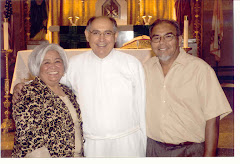
Saint Gabriel

Saint Raphael

Saint Michael
The name Gabriel means "man of God," or "God has shown himself mighty." It appears first in the prophesies of Daniel in the Old Testament. The angel announced to Daniel the prophecy of the seventy weeks. His name also occurs in the apocryphal book of Henoch. He was the angel who appeared to Zachariah to announce the birth of St. John the Baptizer. Finally, he announced to Mary that she would bear a Son Who would be conceived of the Holy Spirit, Son of the Most High, and Saviour of the world. The feast day is September 29th. St. Gabriel is the patron of communications workers.
The name of this archangel (Raphael = "
God has healed") does not appear in the Hebrew Scriptures, and in the
Septuagint only in the Book of Tobias. Here he first appears disguised in human form as the travelling companion of the younger Tobias, calling himself "Azarias the son of the great Ananias". The story of the adventurous journey during which the protective influence of the
angel is shown in many ways including the binding "in the
desert of upper
Egypt" of the demon who had previously slain seven husbands of Sara, daughter of Raguel, is picturesquely related in Tobit 5-11, to which the reader is referred. After the return and the healing of the blindness of the elder Tobias, Azarias makes himself known as "the angel Raphael, one of the seven, who stand before the Lord" (
Tobit 12:15. Cf.
Revelation 8:2). Of these seven "archangels" which appear in the angelology of post-Exilic
Judaism, only three, Gabriel, Michael and Raphael, are mentioned in the canonical Scriptures. The others, according to the Book of Enoch (cf. xxi) are Uriel, Raguel, Sariel, and Jerahmeel, while from other
apocryphal sources we get the variant names Izidkiel, Hanael, and Kepharel instead of the last three in the other list.


















